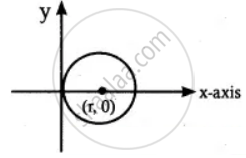Advertisements
Advertisements
प्रश्न
Find the differential equation of the family of circles passing through the origin and having their centres on the x-axis
उत्तर
Given the circles centre on x-axis and the circle is passing through the origin.
Let it be (r, 0) and its radius r
Equation of the circle is
(x – a)2 + (y – b)2 = r2
(x – r)2 + (y – 0)2 = r2
x2 – 2xr + r2 + y2 = r2
x2 – 2xr + y2 = r2 – r2
x2 – 2xr + y2 = 0 ........(1)
Differentiating equation (1) with respect to ‘x’, we get
2x – 2r + 2y `("d"y)/("d"x)` = 0 dx
2x + 2y `("d"y)/("d"x)` = 2r
`x + y ("d"y)/("d"x)` = r
Substituting r value in equation (1), we get
`x^2 - 2x(x + y ("d"y)/("d"x)) + y^2` = 0
`x^2 - 2x^2 - 2xy ("d"y)/("d"x) + y^2` = 0
`- x^2 - 2xy ("d"y)/("d"x) + y^2` = 0
Multiply by '_', we et
`x^2+ 2xy ("d"y)/("d"x) - y^2` = 0
Which is a required differential equation.
APPEARS IN
संबंधित प्रश्न
Obtain the differential equation by eliminating the arbitrary constants from the following equation:
(y - a)2 = 4(x - b)
Obtain the differential equation by eliminating the arbitrary constants from the following equation:
y = c1e2x + c2e5x
Find the differential equation all parabolas having a length of latus rectum 4a and axis is parallel to the axis.
In the following example verify that the given expression is a solution of the corresponding differential equation:
y = `(sin^-1 "x")^2 + "c"; (1 - "x"^2) ("d"^2"y")/"dx"^2 - "x" "dy"/"dx" = 2`
In the following example verify that the given expression is a solution of the corresponding differential equation:
y = e-x + Ax + B; `"e"^"x" ("d"^2"y")/"dx"^2 = 1`
For the following differential equation find the particular solution satisfying the given condition:
`(e^y + 1) cos x + e^y sin x. dy/dx = 0, "when" x = pi/6,` y = 0
Choose the correct option from the given alternatives:
The differential equation of y = `"c"^2 + "c"/"x"` is
Choose the correct option from the given alternatives:
`"x"^2/"a"^2 - "y"^2/"b"^2 = 1` is a solution of
Obtain the differential equation by eliminating the arbitrary constants from the following equation:
y = a sin (x + b)
Find the particular solution of the following differential equation:
(x + y)dy + (x - y)dx = 0; when x = 1 = y
Select and write the correct alternative from the given option for the question
Solution of the equation `x ("d"y)/("d"x)` = y log y is
Find the general solution of `("d"y)/("d"x) = (1 + y^2)/(1 + x^2)`
Find the differential equation of family of all ellipse whose major axis is twice the minor axis
Find the differential equation by eliminating arbitrary constants from the relation y = (c1 + c2x)ex
Verify y = log x + c is the solution of differential equation `x ("d"^2y)/("d"x^2) + ("d"y)/("d"x)` = 0
Find the differential equation corresponding to the family of curves represented by the equation y = Ae8x + Be –8x, where A and B are arbitrary constants
Find the differential equation of the curve represented by xy = aex + be–x + x2
The differential equation of all circles passing through the origin and having their centres on the X-axis is ______.
If 2x = `y^(1/m) + y^(-1/m)`, then show that `(x^2 - 1) (dy/dx)^2` = m2y2
